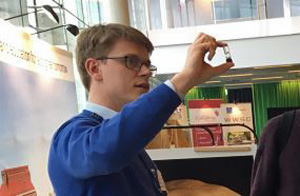Dr. Rosén Awarded Alf de Ruvo Scholarship

Dr. Tomas Rosén’s studies into the dynamics of cellulose nanofibrils secured him this year’s Alf de Ruvo scholarship, established in memory of SCA (Sweden) employee Alf de Ruvo. His findings offer the potential to develop new ways of making cellulose materials that could, one day, replace fossil based material.
"There is a tremendous challenge in describing the motion of the nanofibrils since they are so small that they cannot be observed with visible light in a microscope," said Rosén. However, in his doctoral thesis, Rosén documents how these microscopic non-spherical particles follow a shear flow pattern. This finding he believes could "pave the way for new knowledge when making new materials through controlled assembly of nanoparticles."
It is hoped that, with further research, his work could help find a way to reduce the world’s dependence on fossil raw materials, instead using bio-based ones as the building blocks in manufacturing advanced materials. These could offer a more ecologically friendly and sustainable option than is currently available.
In the process of making paper, the predictions about fiber orientations in the flow of paper pulp are often relying on assumptions of the particles being of insignificant size and that effects of inertia therefore can be neglected. However, this is an assumption that is normally not valid due to the high shear rates in the pulp flow. In his doctoral thesis, Rosén has described how non-spherical particles behave in a sheared flow with the aid of numerical methods. This knowledge can potentially lead to new processes of making paper materials with desired properties.
In recent years, new materials have been developed by utilizing cellulose nanofibrils. These small building blocks of a tree can be assembled to macroscopic fibers and filaments with potential use in new advanced textiles and composite materials. Rosén has in his doctoral thesis also studied these material processes. By using synchrotron based X-ray scattering techniques combined with polarized optical microscopy, Rosén has been able to characterize in detail the dynamics of cellulose nanofibrils in process-related flows. These experiments can subsequently provide the foundation for understanding the governing interactions during the assembly of fibrils into new cellulose materials.
"There is a tremendous challenge in describing the motion of the nanofibrils since they are so small that they cannot be observed with visible light in a microscope. But I foresee a future where we in Sweden can pave the way for new knowledge when making new materials through controlled assembly of nanoparticles. This is enabled thanks to the future scientific environment in Lund with both MaxIV for material characterization with X-rays and ESS for characterization with neutrons," Rosén said.
Rosén is currently working at the department of Mechanics at the Royal Institute of Technology (KTH) in Stockholm, Sweden. His current work is to continue investigating different techniques to characterize dynamics of cellulose nanofibrils in flows. With the help of the scholarship, this project will then be driven forward by the group of prof. Benjamin Hsiao at Stony Brook University, USA.
Rosén was born in Lich, Germany in 1985. He obtained his master’s degree in engineering physics at KTH in Stockholm after having done his master’s thesis project at the Paul Scherrer Institute in Switzerland. Rosén achieved his Ph.D. in engineering mechanics in 2016 at KTH under the supervision of associate professor Fredrik Lundell.
The scholarship was awarded at a ceremony in Stockholm in conjunction with the Ekman Days Conference 2017, on January 24, sponsored by the Swedish Association of Pulp and Paper Engineers.
TAPPI
http://www.tappi.org/
 Dr. Tomas Rosén’s studies into the dynamics of cellulose nanofibrils secured him this year’s Alf de Ruvo scholarship, established in memory of SCA (Sweden) employee Alf de Ruvo. His findings offer the potential to develop new ways of making cellulose materials that could, one day, replace fossil based material.
Dr. Tomas Rosén’s studies into the dynamics of cellulose nanofibrils secured him this year’s Alf de Ruvo scholarship, established in memory of SCA (Sweden) employee Alf de Ruvo. His findings offer the potential to develop new ways of making cellulose materials that could, one day, replace fossil based material.